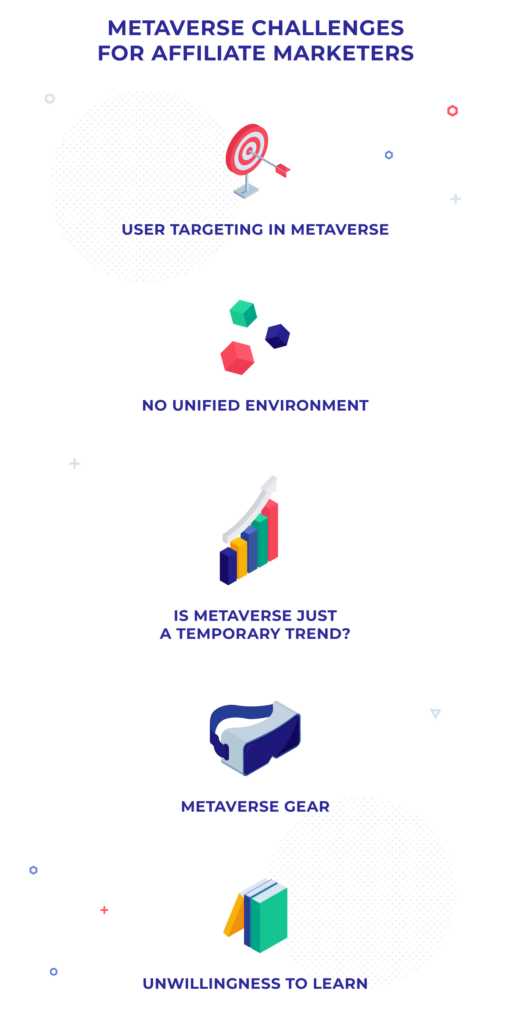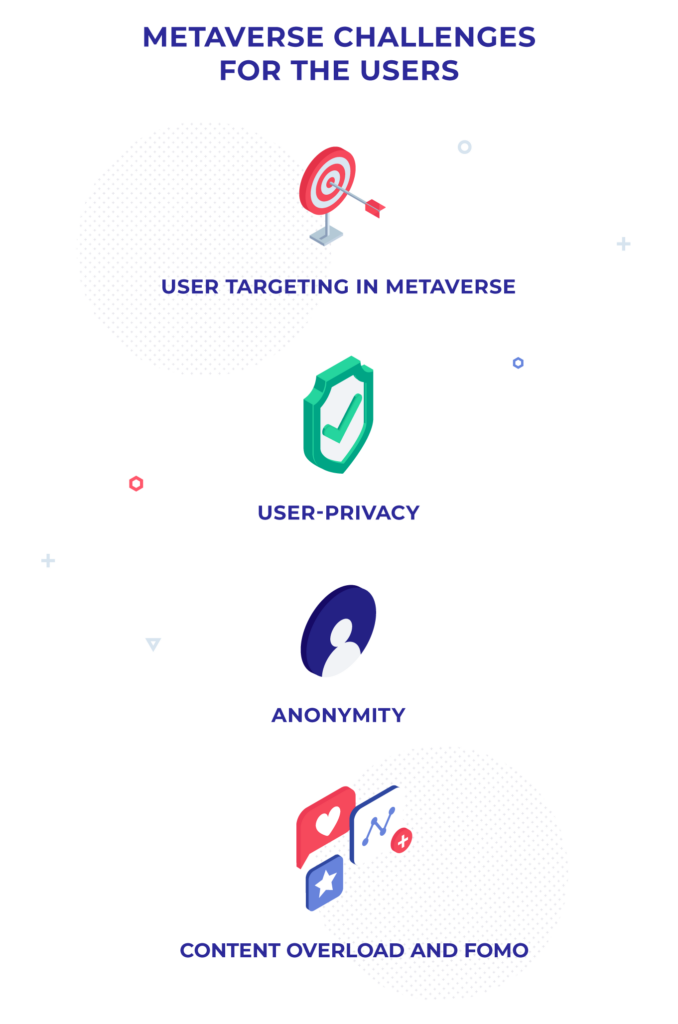As the notion of the Metaverse is still something very new and very abstract, there are a lot of concerns regarding it. Marketers of all kinds, affiliates included, wonder how to navigate through this yet unknown market in the future.
And while some arguments are more founded, others come from simple premonition and the dread of new solutions.
So, sit back, relax, and let us disperse some Metaverse doubts and challenges lying ahead of us.
Metaverse challenges for affiliate marketers
Campaigns in virtual reality have been long disconnected from the physical world, but under no circumstance have they been completely divorced from it. The obvious example of how Internet 2.0 marketing has used real-life resources, is the traditional targeting scheme.
No matter whether it was intent-oriented, demographic, or geographical – it still referred to a real-life person sitting behind an Internet-connected device. This also meant that advertised products and services at least mildly referred to this targeted person’s real-life needs.
The market fears that with the emergence of a fully crystallized Metaverse, marketers will not be able to catch up with digital marketing strategies and solutions. But really, for the industry that draws handfuls from user immersion in the online media, virtual worlds could only be an opportunity.
User targeting in Metaverse
Although this is not yet the case, it may happen that the Metaverse audience will, in a way, become a completely new society. This phenomenon is strictly connected to the degree of anonymity available to the users. So, if the Metaverse is really fully decentralized, then there is a risk that people will develop somehow different consumer behaviors for their real-life personas and their virtual avatars.
Paradoxically, this creates a situation where the affiliate does not necessarily have to match their Internet 2.0 marketing strategy to the Internet 3.0 environment. Just treat this as two different target sources you can reach with your campaigns.
It is not yet established whether an affiliate will have to target conventionally known categories, and even if they will be able to do so. GEOs may be replaced by Metaverse servers/platforms, but the core rules should not really change. The thing is, that there is also a possibility, that geotargeting will be doing really well in virtual reality, and seasoned affiliates will be more than able to use their excessive knowledge on the topic.
In Zeropark you can access a weekly-updated Traffic Insights newsletter with our proposals of GEOs, verticals, and sources, as well as industry news that might be helpful – maybe also for your Metaverse-oriented campaigns?
No unified environment… just yet
In theory, but just yet only in theory, Metaverse should be a unified environment, where a user is free to move around without the need to break the surface of the immersion. For now, however, this is only a vision of the future and more of wishful thinking.
The current metaverse is more like a net created from different platforms offering immersive experiences, but only up to a certain point. The digital world is not yet a fully functioning universe, but rather a set of loosely-connected worlds. As of February 2022, there were 107 gaming apps mentioning Metaverse, 101 finance apps mentioning it, 70 social media apps, 57 entertainment apps, and even more.
Modern affiliate marketers can access the virtual world by promoting these emerging platforms. The biggest challenge will be, for now, finding these offers, which will be attractive to the audiences, as well as finding proper sources for these campaigns. This definitely will be a demanding optimization task, but surely a rewarding one, if done properly.
Just treat different metaverse platforms like you would treat different products. The market for promoting it is impressive and will apparently only be growing. Maybe it’s still a niche, but it has a big potential.
Instability and uncertainty – is Metaverse just a temporary trend?
Probably the most frequently raised concern when the conversation about the Metaverse emerges. Some critics use the argument of the uncertain future of the Metaverse project, and the risk of instability of the idea. Especially the fluctuations and disruptions in the cryptocurrency markets only fuel these narratives, and it’s hard to disagree with people who warn societies to remain cautious when it comes to these topics.
On the other hand, the trendiness of Metaverse and all metaverse-related niches just like augmented reality, virtual reality hardware, virtual real-estate, NFT (Non-Fungible Tokens), cryptocurrencies, or Play 2 Earn games, makes a great trending topic for the affiliates to capitalize on. To put it in simple words – if the trending topic is really trending, its temporality of it should not be a major concern.
If this is the angle we look at this phenomenon from, should the affiliate marketing industry really treat it any different than other hot and trendy niches?
Metaverse-related offers are extremely difficult to run and optimize, as there are not a lot of well-converting sources. People are still getting familiar with the terminology and the interest in virtually enhanced physical reality and other solutions should only increase, meaning there is a high chance of having a broader spectrum of potential targets.
Shortages of Metaverse gear
To enter the Internet 3.0 a user needs to have a set of hardware and gadgets. The most obvious examples are the computing units (computers, mobile phones, or any other devices that will be able to render the 3D graphics in real-time), but also stable, high-speed internet connections and AR/VR technology.
For now, access to these devices and gadgets is highly limited, as not everybody is able to afford it, and the metaverse possibilities are not common enough for people to actually need them. On the other hand, some predictions tell us that global spending on VR and AR should reach $72.8 billion in 2024.
The increasing spending on VR gear, graphic cards, and computers is a promise for these affiliates, who know how to operate within the e-commerce vertical. The increased interest, as well as the impressive pace of this segment’s development, seems like the best occasion to run metaverse hardware offers. If you find good sources for these and outbid the competitors, you can surely become one of the pioneers in the segment.
For more tips on how to run e-commerce offers in general, see our blog articles under the #e-commerce tag.
Virtual worlds are something to catch up with later
Researchers claim that one of the main barriers keeping users from emerging and understanding the topic of Metaverse is the hardships of getting started. This topic is highly abstract and even marketers and media-literate people could have a hard time wrapping their heads around the concept. In that case, let us present the Affiliate Marketer’s take: Should You Enter Metaverse Advertising? article. It should be a good starting point for all affiliates who want to get a hang of what might be awaiting.
We’ve encountered opinions that there is still time to get to know Metaverse. And these opinions are, in fact, both accurate, and not really. There is nothing wrong with waiting for the development of this technology, especially if it does not relate to us.
But one of the things that affiliate marketers, and advertisers in general, should do, is to be constantly up-to-date with the trends. This helps better utilize waves and directions of customer interest for the sake of campaigns.
So, if we were to give judgments, deliberately avoiding the topic is highly NOT recommended. Even basic knowledge will be helpful in case Metaverse happens to become what the promises say – a fully digitalized, unified environment and physically persistent virtual space. If these are uncovered promises only, then there is still some knowledge to be taken from it – and affiliate campaigns to be run based on the trend.

Metaverse challenges for the users
The affiliate world is one item, but there are also major concerns over how the Metaverse will influence people who decide to use it. For now, it’s a matter of closed circles, and most technologically-advanced societies, but as the concept suggests, soon more audiences should embrace emerging technology, and the virtual universe could become mainstream. How will this affect the users?
User-privacy
User-wise, data privacy is probably the biggest worry regarding the Metaverse concept. According to Statista, U.S. internet users have indicated ‘tracking and misuse of personal data’ as their number 1 concern related to the Metaverse. 55% of respondents indicated it as a major concern, and another 24% believe it’s minor, but still a concern. This leaves only 21% of respondents who do not feel like their privacy might be violated in Metaverse.
Privacy is, in general, a major point of concern for Internet users nowadays. It has become an important point on the agenda, and the pressure actually forced the environmental changes. Third-party cookies have become unwanted by the audience members and therefore tracking and data-selling will surely be undesired in the Metaverse as well.
Anonymity
There have been some alarming reports of anonymous incidents of harassment and indecent behaviors inside metaverses. For sure, some regulatory work needs to be performed by the platform operators in order to make sure every user feels safe. But considering that these cases will be rare, there are plenty of positives for marketers coming from anonymity.
Social media platforms should be treated as a reference here, especially with Facebook metaverse endeavors gaining pace. Of course, it’s a priority to have every collective virtual shared space safe for brands and users. But some disruptions should not shake the foundations of marketing in the metaverse. It’s still possible (and very profitable) to target social media users with affiliate campaigns even with anonymous users.
As we have stressed already, the characteristics of virtual avatars might enable advertisers to target completely new audiences and advertise completely new products and services to them. Never before has digital marketing had an opportunity to target the same user with two completely different consumer behavior schemes, ads, and funnels.
Content overload and FOMO
‘Yet another tech solution’, ‘another platform to visit’, ‘another feed to go through every day’…
These have been some of the affiliate’s voices we have heard recently. Will Metaverse become just additional fuel for society’s FOMO (Fear of Missing Out)? As more and more companies will move at least part of their online presence to the Metaverse, it will be natural for people to consume more content inside it. Even 76% of U.S. companies express a willingness to become present in the digital world at some point.
There is no escaping the mediatization of every single aspect of our life. And it is still one’s choice as to how extensively they want to become submerged in the Metaverse. Even without it, most people spend 7 hours a day online.

Metaverse marketing challenges for brands
The worldwide brands seem to be the least worried group of people entering the Metaverse marketing realm. As for now, the presence there is a big asset for them, and a huge advertisement itself. Brand marketers are coming up with more and more innovative ideas for incorporating NFTs, crypto, and virtual or augmented reality into their portfolio, and the companies with the biggest budgets have already produced some impressive campaigns and products.
Branding boundaries
For a part of the industry that is rather skeptical towards Metaverse solutions in general, the boundaries of branding are still something that could be potentially warning in the future. This comes out of the fact that marketing in the metaverse is still shaping.
The virtual environments will most probably have different policies regarding advertisers, and it will not be a problem to target different audiences for the campaigns. This creates a perfect chance for brands to really embrace advertising on Internet 3.0, and in the meantime, make sure that it’s safe for the brands and the users.
The free market will, and already has, set a very strict, much likely real-world-alike set of rules (or else, marketing boundaries), so that the users are safe enough to visit and feel comfortable, but also to create a space where brands can target safe audiences.
In-real-life profitability for brands
Having a campaign launched within the Metaverse is one thing, but making sure that it brings returns in real life is a completely different topic. First, the companies and advertisers, in general, will have to come up with completely new conversion funnels to make sure their audiences are safely guided and engaged with the campaigns.
This requires an understanding of trends and user preferences in the virtual world. If done correctly, the brands and affiliates should be able to find the right sources for their needs and convert them in the desired way. Remember that Metaverse societies are, and most probably will be, highly consumerist. Therefore, finding purchase-intent users should be a way to success for many companies looking for new leads.
[blog-banner id=”4716″ name=”zp-in-text-banner”]
Summary: Metaverse doubts and challenges for marketers
No matter who you are targeting on an everyday basis, and what kind of advertising is your favorite… we’re pretty sure that it will have a representation in the Metaverse as well.
Let us stress it again that Zeropark is only a neutral observer of the Metaverse development stages. We are by no means endorsing these solutions, but instead, we encourage marketing specialists to explore the topic.
Panic or making hasty and uninformed decisions, however, is something you will want to avoid for now. Most concerns regarding the Metaverse come either from technological conservatism, or the fact that the path this solution follows is still unknown.
Naturally, constructive criticism, for example regarding the unstable blockchain situation, is justified. That is why we advise caution. Then again, given a lot of positives that the Metaverse project may bring for marketers (if approached well) could mean it’ll become your next key to marketing success.
Let us summarize some interesting points:
- Metaverse operators should be able to create brand-safe and user-safe environments to maximize profits.
- Big brands are the perfect example of how a good understanding of a concept, as well as creativity, works best for Metaverse marketing.
- The Metaverse will redefine conversion funnels and how to approach a single audience member.
- Privacy of data will need to be protected if Metaverse operators want to lure in advertisers.
- The Metaverse-related gear and hardware will become more accessible, as the market grows without stopping.
Metaverse advertising options are already here.
Register with Zeropark and discover the opportunities today!
Łukasz Pośpiech





